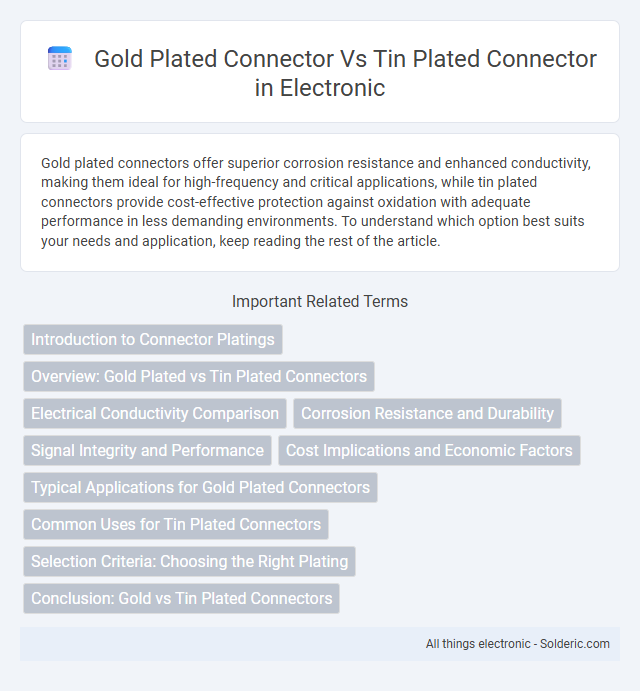Gold plated connectors offer superior corrosion resistance and enhanced conductivity, making them ideal for high-frequency and critical applications, while tin plated connectors provide cost-effective protection against oxidation with adequate performance in less demanding environments. To understand which option best suits your needs and application, keep reading the rest of the article.
Comparison Table
| Feature | Gold Plated Connector | Tin Plated Connector |
|---|---|---|
| Corrosion Resistance | High - Resists oxidation, ensures long-term reliability | Moderate - Prone to oxidation over time |
| Conductivity | Excellent - Superior electrical conductivity | Good - Adequate for most applications but less conductive than gold |
| Durability | High - Maintains integrity under frequent mating cycles | Moderate - Wears faster with repeated connections |
| Cost | High - More expensive due to gold material | Low - Cost-effective for budget-sensitive applications |
| Typical Applications | High-performance electronics, aerospace, telecommunications | General electronics, consumer devices, low-cost assemblies |
| Solderability | Good - Solder joints are stable but require proper technique | Excellent - Easy to solder with minimal preparation |
Introduction to Connector Platings
Gold plated connectors offer superior corrosion resistance and excellent conductivity, making them ideal for high-performance and sensitive electronic applications. Tin plated connectors provide cost-effective corrosion protection and good solderability, commonly used in general-purpose and low-frequency circuits. Choosing the right plating depends on your specific requirements for durability, conductivity, and budget in connector performance.
Overview: Gold Plated vs Tin Plated Connectors
Gold plated connectors offer superior corrosion resistance and enhanced conductivity, making them ideal for high-frequency or critical signal applications. Tin plated connectors provide cost-effective protection against oxidation but have higher contact resistance and wear over time. Choosing the right plating depends on Your device's performance requirements and environmental conditions.
Electrical Conductivity Comparison
Gold plated connectors exhibit superior electrical conductivity compared to tin plated connectors due to gold's low contact resistance and excellent corrosion resistance. This ensures more reliable signal transmission and reduces signal loss in critical electronic applications. Your choice of connector plating can significantly impact performance, especially in environments requiring stable and consistent electrical connections.
Corrosion Resistance and Durability
Gold plated connectors exhibit superior corrosion resistance due to gold's inert properties, preventing oxidation and ensuring reliable electrical conductivity over time. Tin plated connectors, while more affordable, are prone to oxidation and wear, which can degrade performance in harsh environments. The enhanced durability of gold plating makes it ideal for critical applications requiring long-term stability and minimal maintenance.
Signal Integrity and Performance
Gold plated connectors provide superior signal integrity and performance due to their excellent corrosion resistance and low contact resistance, ensuring stable and reliable electrical connections over time. Tin plated connectors may initially offer good conductivity but can degrade faster under environmental stress, leading to increased signal loss and potential interference. For high-frequency or sensitive applications, gold plating is preferred to maintain consistent signal quality and minimize data errors.
Cost Implications and Economic Factors
Gold plated connectors generally have higher upfront costs due to the price of gold and the specialized plating process, but they offer superior corrosion resistance and longevity, reducing maintenance and replacement expenses over time. Tin plated connectors are more economical initially and widely used in budget-sensitive applications, though they may require more frequent replacements due to susceptibility to oxidation and wear. Your choice between gold plated and tin plated connectors should balance initial investment against long-term reliability and total cost of ownership.
Typical Applications for Gold Plated Connectors
Gold plated connectors are typically used in high-reliability applications such as aerospace, medical devices, and telecommunications due to their superior corrosion resistance and excellent conductivity. These connectors ensure stable signal transmission in environments prone to oxidation and wear. Their enhanced durability and low contact resistance make them ideal for critical data and power connections where performance integrity is essential.
Common Uses for Tin Plated Connectors
Tin plated connectors are widely used in everyday applications such as household electronics, automotive wiring, and industrial machinery due to their cost-effectiveness and reliable corrosion resistance. Your choice of tin plating is ideal for environments where moderate protection against oxidation and good solderability are essential without the premium cost of gold plating. These connectors perform well in low-voltage or non-critical signal transmission scenarios where durability and budget efficiency are prioritized.
Selection Criteria: Choosing the Right Plating
Gold plated connectors provide superior corrosion resistance and excellent electrical conductivity, making them ideal for high-frequency signals and harsh environments. Tin plated connectors offer cost-effective protection against oxidation and are suitable for general-purpose applications with lower electrical performance requirements. Selection criteria should prioritize factors such as environmental exposure, signal integrity needs, budget constraints, and durability expectations to determine the appropriate plating type.
Conclusion: Gold vs Tin Plated Connectors
Gold plated connectors offer superior corrosion resistance and enhanced conductivity, making them ideal for high-frequency and critical signal applications. Tin plated connectors provide a cost-effective solution with decent solderability but are prone to oxidation over time, potentially impacting performance. Choosing gold plated connectors ensures longer durability and reliable signal integrity, benefiting your sensitive electronic devices.
Gold plated connector vs tin plated connector Infographic

 solderic.com
solderic.com